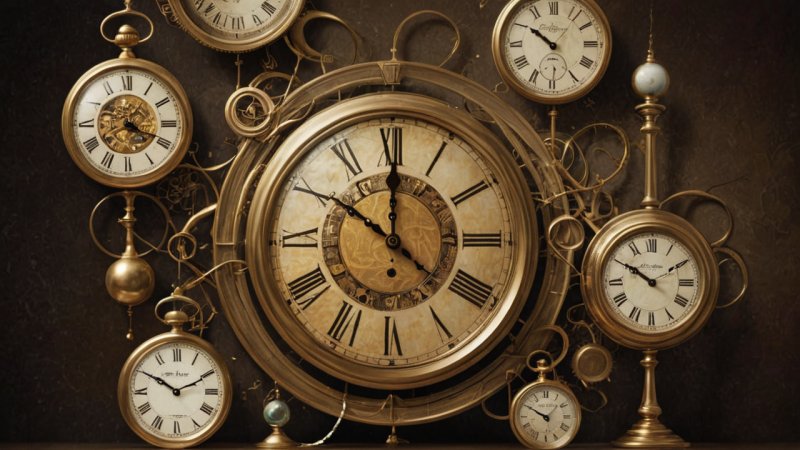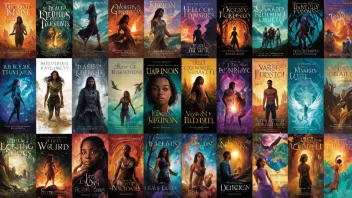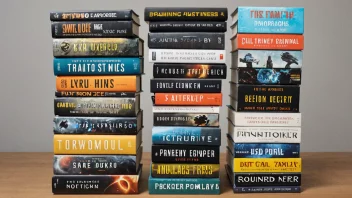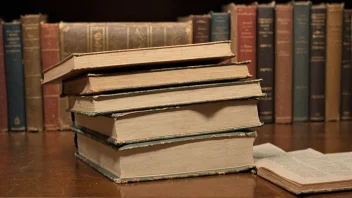The concept of time has intrigued philosophers, scientists, and writers alike for centuries. It is a pervasive theme that influences our lives, shapes our experiences, and defines the very fabric of reality. Non-fiction literature has provided a vast array of insights into the nature of time, from the scientific to the philosophical, the historical to the personal. This article aims to explore several remarkable non-fiction works that delve into the concept of time, offering a comprehensive analysis of their themes, implications, and contributions to our understanding of this elusive dimension.
1. The Nature of Time
Understanding time is a complex endeavor that has evolved over centuries. Non-fiction works that address the nature of time often grapple with fundamental questions such as: What is time? Is it linear or cyclical? Can it be measured or is it a subjective experience? In this section, we will examine some key texts that explore these questions.
1.1. “A Brief History of Time” by Stephen Hawking
In this seminal work, physicist Stephen Hawking presents an accessible exploration of time from a scientific perspective. He discusses the origins of the universe, black holes, and the nature of time itself. Hawking introduces the concept of time as a dimension that is intertwined with space, forming the very fabric of the universe. His ability to distill complex scientific ideas into engaging prose has made this book a cornerstone of modern science literature.
1.2. “Time: A Very Short Introduction” by Barbara Rosen
Rosen's concise yet insightful book offers an overview of the philosophical and scientific understandings of time. She discusses the paradoxes associated with time, such as the arrow of time and the nature of time travel. This book serves as an excellent entry point for readers new to the subject and provides a solid foundation for further exploration.
2. Philosophical Perspectives on Time
Philosophy has long been engaged with the concept of time, contemplating its implications for existence, consciousness, and reality. In this section, we will explore non-fiction works that present philosophical perspectives on time.
2.1. “The Philosophy of Time” by Richard Gale
Gale’s work offers a comprehensive analysis of various philosophical theories regarding time, including presentism, eternalism, and the relational theory of time. He examines how these theories relate to notions of reality, change, and causation, encouraging readers to reflect on their own understanding of temporal existence.
2.2. “Time and the Other: How Anthropology Makes Its Object” by Emmanuel Levinas
In this thought-provoking text, Levinas explores the relationship between time and the Other, emphasizing the ethical implications of our understanding of time. He argues that our perception of time influences our interactions with others and shapes our ethical responsibilities. This work challenges readers to reconsider their relationship with time as it relates to social and moral dimensions.
3. Historical Contexts of Time
Understanding how different cultures and societies have perceived and measured time can provide valuable insights into human history and evolution. This section highlights non-fiction works that explore the historical development of timekeeping and cultural interpretations of time.
3.1. “A History of Time: A Brief History of Timekeeping” by David S. Landes
Landes provides a historical overview of timekeeping devices, from ancient sundials to modern atomic clocks. He discusses how advancements in timekeeping technology have influenced society, economics, and culture. This work emphasizes the profound impact of time measurement on human development and interaction.
3.2. “The Time Machine” by H.G. Wells (Analysis)
While primarily a work of fiction, Wells’ classic novella serves as a poignant commentary on the Victorian understanding of time and social progress. This analysis explores how Wells uses time travel as a narrative device to critique the social issues of his time, prompting readers to reflect on the implications of temporal exploration.
4. Personal Reflections on Time
Many authors use non-fiction to explore their personal relationship with time, capturing the subjective experience of living within its flow. In this section, we will highlight works that provide personal reflections on time.
4.1. “The Art of Time Travel” by James Gleick
Gleick’s exploration of time travel encompasses both scientific and personal reflections, blending memoir with analysis. He discusses the cultural fascination with time travel, its representation in literature and film, and how this concept affects our understanding of the past and future. Gleick's personal anecdotes enhance the narrative, making it both informative and relatable.
4.2. “Time and Again” by Jack Finney (Analysis)
Although a work of fiction, Finney’s narrative about a man traveling back to 1882 New York serves as a lens through which to explore the emotional and psychological aspects of time. This analysis delves into the themes of nostalgia, memory, and the desire to reconnect with a lost past, highlighting how time influences our identities.
5. The Science of Time
In recent years, scientific explorations of time have gained significant traction, particularly with advancements in physics and neuroscience. This section will examine non-fiction works that focus on the scientific understanding of time.
5.1. “The Order of Time” by Carlo Rovelli
In this compelling book, physicist Carlo Rovelli challenges traditional notions of time, proposing that time is not a linear progression but rather a complex interplay of events and experiences. He blends scientific insights with philosophical reflections, encouraging readers to rethink their understanding of time as an absolute entity.
5.2. “Einstein’s Dreams” by Alan Lightman (Analysis)
This unique narrative blends fiction and non-fiction, presenting a series of imaginative vignettes that explore different concepts of time as envisioned by Einstein. This analysis highlights how Lightman’s creative exploration invites readers to ponder the subjective experience of time and its various interpretations across cultures and epochs.
6. Literary Trends and Time
Time has been a central theme in literature for centuries, influencing narrative structures and character development. This section will examine contemporary literary trends that focus on time.
6.1. Time in Contemporary Literature
Contemporary authors increasingly experiment with non-linear narratives, reflecting the complexities of time in modern life. Works such as “The Night Circus” by Erin Morgenstern and “The Time Traveler’s Wife” by Audrey Niffenegger exemplify this trend, using time as a narrative device that shapes characters’ experiences and relationships.
6.2. The Rise of Memoir and Time
Memoirs focusing on personal experiences often grapple with the concept of time, reflecting on how past experiences shape identity. Authors like Joan Didion and Maya Angelou use their reflections on time to illuminate broader societal issues, creating a powerful connection between personal narrative and historical context.
7. Conclusion
In conclusion, the exploration of time through non-fiction literature offers a rich tapestry of insights that span scientific, philosophical, historical, and personal dimensions. From Stephen Hawking’s scientific inquiries to Richard Gale's philosophical analyses, these works challenge our understanding and perception of time. By engaging with these texts, readers can deepen their appreciation of time's complexities and its profound impact on human experience. As we continue to explore the concept of time, we are reminded of its ever-present influence on our lives, shaping the way we understand ourselves and the world around us.






